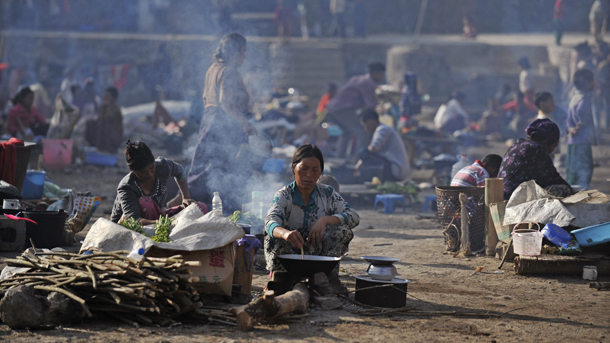United Nations (UN) aid agencies will provide supplies to war refugees in conflict-ridden Kachin State for only the third time since March after the Burmese government agreed to let relief workers access the main rebel-controlled area.
Samang Kada Doi Pyi Sa, the chairman of the IDPs and Refugees Relief Committee (IRRC), told The Irrawaddy on Monday that the UN has already informed his group that they will soon arrive in Laiza.
“They told us they will come in the first week of June,” he said.
The UN has been forbidden from traveling to rebel-held areas until now due to escalating fighting between government troops and the Kachin Independence Army (KIA), the military wing of Kachin Independence Organization (KIO).
Local Kachin aid groups have reported difficulties providing food and supplies to the estimated 70,000 refugees sheltering in Pangwa, Laiza, Mai Ja Yang and other parts of China’s southeastern Yunnan Province after UN agencies were refused access.
“We have many problems if we have to stay,” said Samang Kada Doi Pyi Sa. “We have to build enough shelters and schools for children as it is rainy. Many of the children cannot join classes yet as we are still building the schools. They may able to join in the middle of June.”
Regarding the lack of safety for UN agencies to travel in KIA areas, Samang Kada Doi Pyi Sa said it depends on the government. If they told their ground troops to stop fighting then there will be sufficient security, he said.
Local aid groups said that the UN agencies will only come to Laiza this time and not the other refugee camps in Pangwa, Mai Ja Yang and other parts of Yunnan Province. There are around 10,000 refugees in Laiza alone, according to the IRRC.
Mai Li Awng, a spokesperson for Wun Tawng Ningtwey (Light for the Kachin People) local relief group based in Mai Ja Yang, said they do not have enough food for refugees next month.
“We are thinking about what to provide them next month because we will soon run out of food,” she said.
“For me, I want the UN to come as soon as possible,” she added. “There is no fighting in Mai Ja Yang now. They have only deployed more troops. That is not a good reason to say there is no security and they cannot come.”
UN agencies sent aid in March and early April but have not been unable to do so for two weeks while clashes escalate due to more government troops being deployed around the KIA’s headquarters in Laiza.
The intensifying conflict has also led to an increase in the number of refugees arriving at camps near Laiza and Pangwa. Mai Li Awng said that there are around 1,000 refugees in Pangwa and her group was unable to provide them with enough to eat.
The IRRC is a relief team set up by the KIO which coordinates efforts to build more shelters for refugees, but it is not clear if they have sufficient materials available to provide for everyone living in the already overcrowded camps.
Fighting in Kachin State broke out last June ending a 17-year-old ceasefire. The conflict has continued since that time despite repeated attempts at negotiations.
Aung Min, Naypyidaw’s Railways Minister and a leading peace negotiator, held an informal meeting with KIO leaders last week in Chiang Mai, northern Thailand.
A report from New York-based human rights group Amnesty International last week accused the Burmese government of crimes against humanity as its troops have launched military offensives against the Kachin rebels which have led to civilians suffering serious abuses.
















